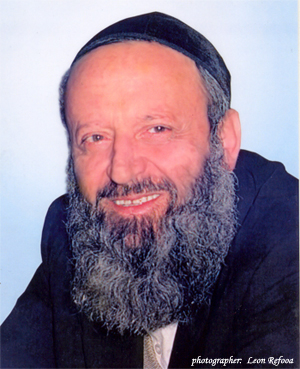
Uriel Davidi was born on Yom Kippur in 5685 Hebrew (1924 A.D.) into a religious family in the city of Khansar.
He was the son of the well-known rabbi from Khansar and religious authority, Rabbi Meir Davidi. Starting from a young age, Uriel studied and memorized various prayers, Tikkun Chatzot (midnight prayer), Tanakh, and other Midrashim under his father’s guidance. He went on to master the principles of Jewish law, Torah, Mishnah, Gemara, and other advanced levels of jurisprudence, supervised by Jewish scholars and in religious schools.
Quite soon, Uriel Davidi became a religious instructor despite his young age. Over time, he assumed responsibility for teaching various religious disciplines, including Shochet (kosher slaughterer), Mohel (circumciser), Sha’liach Tzibur (prayer leader), and Dayan (religious judge). —
In 1949, Rabbi Uriel Davidi married his cousin’s daughter, Bolour Davidi — a unity that resulted in four sons and two daughters. All their sons pursued cultural and religious endeavors. Rabbi Nasim Davidi, for instance, is responsible for overseeing the kashrut of food products in Los Angeles (that food is obtained as religion mandates), and he also performs the duties of a Mohel.
In 1955, Mr. Davidi relocated to Tehran with his family, where he initially engaged in cultural activities as a teacher and became an active member of the newly found “Otzer Hatorah” foundation, working in schools associated with the Tehran Jewish Community (Ganj-e Danesh cultural group) and later at Alliance schools. He also spent some time as an inspector of Alliance schools and taught in seminars organized for teacher training on behalf of Otzer Hatorah.
Rabbi Davidi’s outstanding qualities — particularly his virtue, humility, and eloquent speech — led him to be regarded as one of the cherished instructors of Otzer Hatorah in Iran. He collaborated wholeheartedly for many years with the late Rav levi and other leaders in supervising and planning the activities of this important cultural institution.
It was in 1966 when the dispute resolution committee of the Jewish Community (Dar al-Shar’) invited him to collaborate. Shortly after, with the addition of Rav Paluz, he became one of the five permanent members of “Beth din”, a subcommittee of the Jewish Community. He also established connections and cooperation with religious and cultural authorities of other Iranian provinces.
When Rav Paluz returned to Jerusalem, he left a void behind that needed to be addressed by the Jewish community. Therefore, the Iranian Jewish Community, represented by the late Yosef Cohen (Jewish representative in the Iranian parliament), requested permission from the Ministry of the Interior to establish a Jewish Rabbinical Court supervised by Rabbi Uriel.
With the opening of the Marriage Registration Office, he officially became one of the four registrars responsible for marriage registration and other religious matters in the Jewish community. Although he did not favor divorce, he did issue divorce certificates when necessary, especially after the 1979 revolution in Iran. With the assistance of Beth din (religious court) in other countries, he made fruitful efforts in religious matters, particularly concerning the Agunah issue, which pertains to women unable to obtain a religious divorce from their husbands, meaning they were neither with their husbands nor divorced, and therefore, could not remarry. Rabbi Uriel made substantial and successful efforts, often through their husbands, to resolve such legal disputes.
Rabbi Uriel Davidi was widely respected among students and intellectuals. Regardless of his profound sense of responsibility towards the Jewish community, he was always praised by fellow citizens, government officials, and especially other rabbis and scholars for his unique personality and the respect he had for fellow human beings. When Rabbi Shlomo Hillel and Rabbi Salman Khugi visited Iran, Rabbi Uriel asked them to examine whether he qualifies as a Rabbi. They confirmed and granted certificates affirming his rabbinical authority.
Rabbi Uriel Davidi was well-versed in Islamic jurisprudence. He had a good knowledge of Persian literature and was fully proficient in both classical and modern Hebrew. Occasionally, he engaged in scholarly discussions with other Islamic scholars and scholars of different religions, especially with the late Allameh Tabatabai. He expressed his views based on the principles of rhetoric, and his speeches had straightforward beginnings and endings. He spoke logically and with evidence, demonstrating his deep knowledge and insight into Jewish theology. He also collaborated with the linguist and famous writer Solomon Haim in compiling Persian-Hebrew and Hebrew-Persian dictionaries, to the extent that in his will, Solomon Haim entrusted the completion of the Persian-Hebrew dictionary to Rabbi Uriel and individuals approved by him.
After the Islamic Revolution in Iran and the emigration of Rabbi Yedidia Shofet from the country, which led to a religious leadership vacuum, despite having numerous responsibilities — especially as the head of the Jewish religious court (Beth din) — Rabbi Uriel Davidi accepted the challenging role of spiritual leadership and religious authority for the Jews of Iran.
With tireless dedication, he faced the most sensitive situations experienced by the Jews during a difficult time of exile (Galut) — challenges that imposed such fear and apprehension that Jews considered migrating from Iran. He successfully addressed the challenges and breathed new life into the community. He established solid and warm relationships between the Jewish community and fellow citizens and government officials.
Rabbi Davidi not only strengthened the bonds between the Jewish community and their fellow citizens and government officials but also played a pivotal role in amending Jewish inheritance laws based on the requests of his peers. He also reminded the authorities of the Islamic Republic of the Qisas (retaliation) law within the judiciary. Whenever he sensed that his presence was necessary, he attended without hesitation, staunchly defending the beliefs, credibility, dignity, and welfare of the Jewish community.
From the 1980s until the mid-1994, with the closure of Rabbi Yedidia Shofet’s classes, Rabbi Yosef ursharga, Rabbi Baroukh Kohansedgh, and Rabbi Uriel personally handled the duties of the Jewish community. In most cases, as the spiritual leader and religious authority, he refrained from receiving any form of compensation or fees, especially for his speeches. It should be mentioned that he was the first person in Tehran to initiate the teaching of Talmud in a classical manner, following the practices of reputable teachers.
Due to an overload of responsibilities and health issues, Rabbi Uriel stepped back from his assigned duties in 1994. Shortly afterward, driven by a desire for pilgrimage and to visit relatives, he set out for Jerusalem, where, with the insistence of those around him, he settled and spent his retirement serving the community as a spiritual leader. Unfortunately, he did not have the opportunity during his lifetime to publish works that could have had a significant impact on promoting and preserving Iranian Jewish culture.
Rabbi Uriel Davidi bid farewell to this mortal world at the age of 81, on the 22nd of Heshvan 5766 Hebrew, corresponding to the 25th November 2005.
Rabbi Uriel Davidi’s legacy extends beyond his lifetime. His contributions to the Iranian Jewish community, his leadership during challenging times, and his dedication to preserving the Jewish heritage in Iran are deeply cherished. He played a pivotal role in the community’s resilience during a turbulent period. Despite not being able to publish his works during his lifetime, the impact of his knowledge and leadership remains a cornerstone of the Iranian Jewish community’s history. His devotion to teaching and religious guidance left an unforgettable mark on the community. Rabbi Uriel Davidi passed away on the 22nd of Heshvan 5766 in the Hebrew calendar, equivalent to the 4th of Azar 1384 in the Persian calendar, at the age of 81.


 فارسی
فارسی